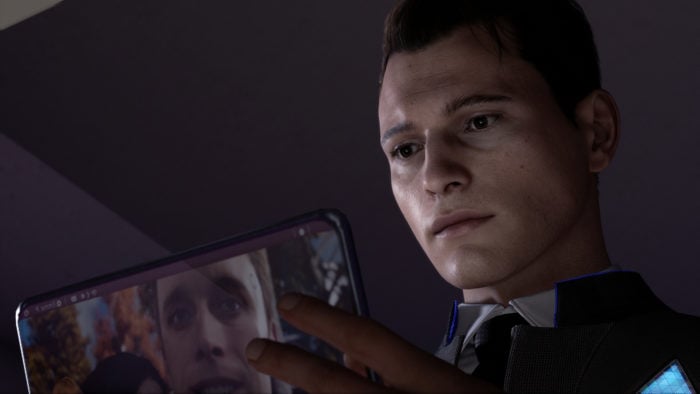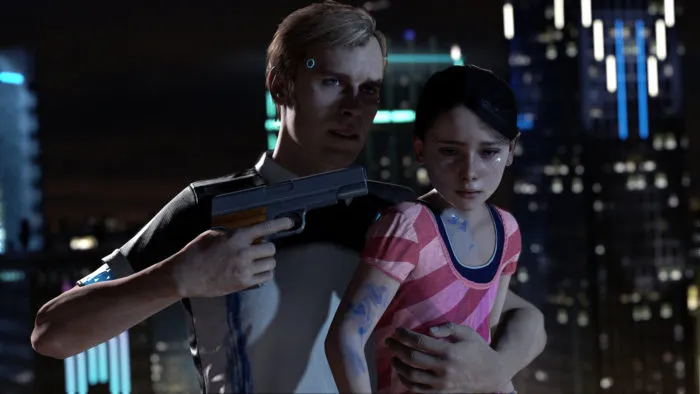Detroit: Become Human lives and dies by the works that came before it. The latest offering from Quantic Dream, the developer of Heavy Rain and Beyond: Two Souls, Detroit finds itself in a far different landscape from that which its predecessors were a part of. In the years since Quantic made itself a well known name in the world of story driven titles, other studios like Telltale Games and Supermassive Games have made their own mark with titles like The Walking Dead and Until Dawn respectively. As a result, the landscape of games defined by their narratives, dialogue and characters have improved and changed drastically, leaving many wondering if Quantic’s latest offering could adapt and improve, or if it would feel behind on the times.
Luckily, Detroit stands out as a well-polished and interesting story driven title, and demonstrates that Quantic Dream has grown since we last saw them. It’s tale of androids discovering their humanity, and their fight to obtain freedom is one that, like Until Dawn, uses what’s already been shown in other mediums and brings it to video games wonderfully. Where Supermassive’s take on campy slasher flicks allowed players to influence and come to care about horror movie trope characters, Detroit does the same with its own cast of characters. From Markus’ evolution from docile caretaker to revolutionary, to Connor’s change of heart from deviant tracker to truth seeker, and Kara’s determination to protect a young girl from harm, each character arc carries trademark notes and themes from other dramatic and science fiction works in the best way. Adapting them into a video game format for a title that feels familiar, and yet also fresh and intriguing.
More importantly, the story feels like it is meaningfully impacted by the choices players make. Like Telltale’s myriad of titles, each scenario in Detroit has several decisions for the characters to make, altering the outcome of a situation and influencing the actions or reactions of side characters. Going further than these titles though, a simple dialogue choice between a peaceful or aggressive response can splinter off into countless different outcomes, and may even lead players down the road toward an entirely different path than they otherwise would have gotten. Better yet, the different branching paths they can send players down are shown at the end of levels, providing proof that players will be rewarded in kind for making their own choices throughout the title.
This is a refreshing change of pace not only for a story driven game, but for Quantic Dream’s work in particular. While Heavy Rain and Beyond: Two Souls each had their fair share of choices to be made by the player, they always felt like gimmicks in the end, allowing players to make slight detours before being shepherded back onto a pre-established track for the main story’s sake. Heavy Rain came the closest to breaking from this feeling, allowing the story to progress even if certain characters are killed, but still didn’t quite measure up to lofty player expectations when it comes to choice impact.

Detroit, however, is a culmination of what those titles could, and should have, been. Each player’s experience feels molded by their choices thanks to the far reaching consequences they can carry, no matter how trivial they may have seemed at the time. Trying too hard to get an investigator to like you can lead to their hating the player character, choosing the wrong route of escape can lead to the player’s arrest and capture, and vying for violence over peace can throw the entire world into turmoil by the time the credits roll.
Granted there are still some flaws to be found in the story and its delivery. Moments like a dirtbag son hamming up his “you love the android more than me” speech feel schlocky, and a lot of the interactions with child characters can be downright groan-worthy thanks to some odd writing and direction choices. There’s also little that drives the subject matter forward, with the same retreads that help the title feel familiar holding it back from becoming something all its own; Markus’ journey has striking similarities to “I, Robot’s” Sonny, Connor’s arc is highly reminiscent of “Blade Runner.” This is to say nothing of the gameplay which, while usually unobtrusive, can bog down the story at times with tricky quick time events weighing heavily into what happens.
And yet, at the end of the day, the game still manages to be exactly what it needs to: A competent and entertaining sci-fi drama that incorporates player choice in a way we haven’t seen before, at least not at this level.













Updated: May 31, 2018 12:07 am